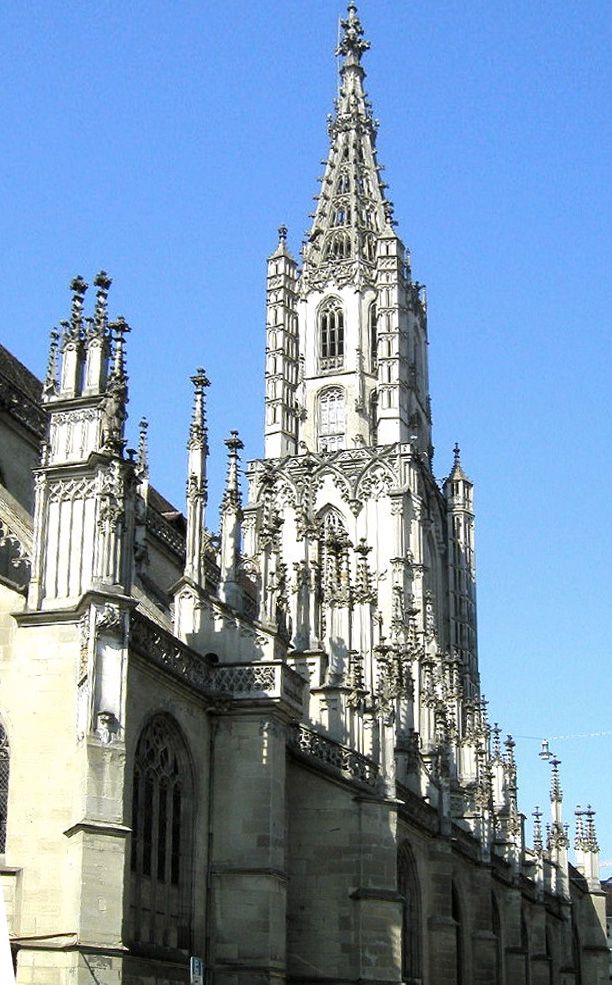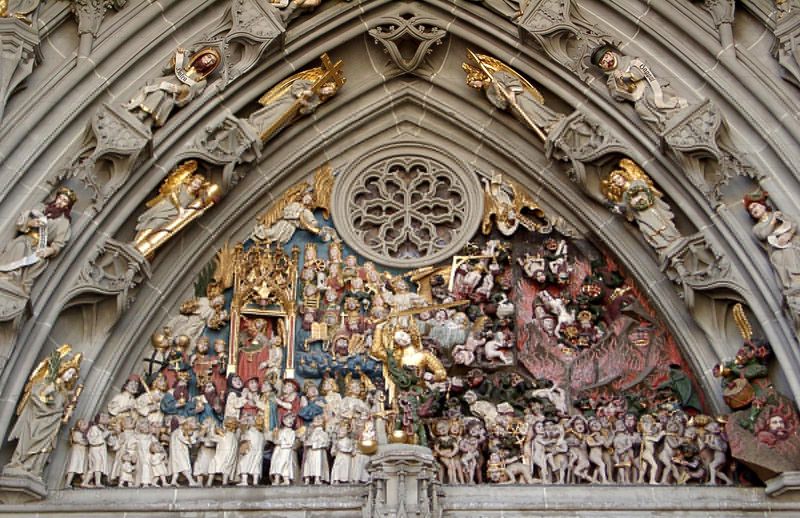47. Of Religion
At the hotel desk, David and Maria were given the key to their new room and informed their belongings had been moved there. They went up to examine it and refresh. "Smaller, but still spacious," David said as he looked at the bedroom's large sitting area, checked the water closet and the bathroom, and then opened a blank door.
"That's an adjoining door, the same as the one in the suite." She sat on the chaise longue and looked up at him. "I'm not at all hungry. I guess the late breakfast is still with me. What shall we do?"
"We could walk again through the old town. Visit the streets we haven't yet seen. I'd like to go into the cathedral to examine its architecture and embellishments. If we get hungry, we can stop along the way."
"We can go inside the cathedral? I've never thought of doing that."
"Yes, certainly we can. You've never been in one?"
"No ... guess I thought I'd be unwelcome with my strange beliefs."
"It's not your beliefs that are strange, but the beliefs of those who had the churches built. They believe by manipulating the emotions of the people and by scaring them with strange stories, they'll have a loyal following who will beg to find salvation from the imagined horrors. It's on the backs of those scared people the churches were built. Generations of them, essentially enslaved by the Church hierarchy who sit back in luxurious comfort."
"I've never thought of such things. So the churches were built as monuments to greed by using fear?"
"Essentially, yes. Think a moment. What would motivate poor peasants to spend their entire lives building a magnificent building while they continued to live in squalor? They lived under the fear of eternal damnation." He shook his head. "Their eternal damnations were their wasted lives; damned by the greed of the Church."
"I often walked around the Münster in Freiburg during my lunch breaks, admiring the intricately carved stone. Odd, I never thought of going inside."
He held out his hand to her. "Come, let's go look at the interior of Berner Münster. Most church interiors are far more impressive than their exteriors." He led her to the door and continued talking as they walked.
"Think of the peasants. Living in squalor in cramped, cold, and dank mud-floored hovels, but being allowed to visit the House of God. Allowed to be in a relatively dry and warm place with immense space, intricately carved wood and stone ornamentation, rich tapestries, vivid paintings and wonderful music. Would not the setting evoke an awe of the power in the hands of the priests?"
They descended the stairs. "Think of how impressed we are by this stairwell, even with no stories fabricated tying it to salvation from eternal damnation. We admire it for what it is. We have no great Gothic churches in western Canada; the country's far too young for that. The first I saw was the Abbey in Bath, built in the eleventh and twelfth centuries."
They nodded thanks to the doorman as they walked out into the street. "It has an intricately carved exterior. Up the front tower are two very tall stone ladders with carved angels climbing to heaven. The interior is like an exquisite work of art. Massive and impressive." He held his arms up, fanned his fingers and arched his wrists. "The arches holding up the roof look like this, but they're of finely carved stone."
"From what you say, it would be difficult not to be impressed."
"The peasants were led to believe the power that had built this would save their souls." David laughed. "The sad thing is that they didn't realise that they were the power that had built the church. It was their labour, their sweat and blood, their tithes. The Church coerced them into thinking they must suffer through life so they might enjoy Heaven later."
"Rather than enjoying being alive. That seems strange. Why would people believe such a thing?"
"The priests used elaborate stories to instil fear and telling of the evils that befall those who don't honour God through them and through Jesus Christ."
"And what did the peasants get from this? Surely there was a reward for them."
"They received the hope that things would be better after they died, they got to watch the clergy live comfortably, and they got to visit the magnificent churches they had sacrificed their lives building and maintaining. And they got to listen to the priests calling them evil sinners who had made it necessary for Christ to die on the cross to offer them a hope of salvation."
"Sounds like coercion and deceit to me. How could the priests have influenced so many? Did they use hypnosis?"
"It was a gradual process as the coerced parents passed the beliefs to their children to rid them of original sin – a concocted story that all are born as sinners and they must be purged to have any hope of everlasting life in Heaven. Over the generations, the people were subjugated, and as the Church grew in power and wealth, the scary stories became more elaborate."

They turned the corner into Münsterplatz, and as they looked up at the tower, Maria said, "The history pages call this the tallest building in all of Switzerland. Over a hundred metres from base to tip of the spire."
David pointed up into the arch of the central portico as they approached. "There, this is one of the themes of the scary stories. Tell me what you see in it."
"On one side, all the people are clothed in fine gowns and appear happy and thankful. On the other side, the people are naked and look to be suffering and afraid. Some are burning in fires, and there are monsters and hideous faces."

"This depicts the Last Judgement, a central theme of Christianity and of some other religions. The story about the judgement is that the wicked will be separated from the righteous. The good people will be eternally with God in Heaven, and the evil will burn forever in Hell."
Maria nodded. "So being over the main entrance to the church would remind people of the message each time they entered. Such finely-wrought carvings, and on such a large scale. These would have taken many years to complete."
"Most of the great churches and cathedrals took generations to build, and as work progressed, the people felt increasingly invested in the structure they were helping build. Helping with their labour and with the offerings of goods and money they were compelled to give to the Church. The Church grew wealthier, the clergy lived more luxuriously, and the people continued to grovel and suffer, with only the hope they would be among the righteous on judgement day."
"How do you know so much about these things? I guess I needn't ask. You know so much about so many things."
"Thinking in the mountains. I now see the abuses by the priest and then being used by Sister Clemencia ... Those sent me into myself. Probably the reason I began escaping to the mountains to be alone. I started questioning the dogma that had been forced into my head. The more I thought, the less sense it made. There was a series of lectures I attended while in university: A Logical Look at Religion."
"So there's a logic to all of this. Seems illogical to me that so many have wasted their lives suffering while focused on some eventual easier time they were told existed after death."
"The logic is from the point of view of the leaders of the religions. Coerce the people into serving them; coerce the people into providing them with easier lives."
Bạn đang đọc truyện trên: AzTruyen.Top